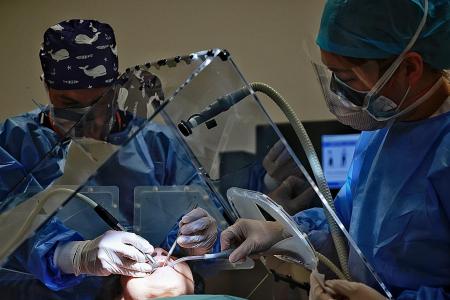NUS researchers invent 'tent' to protect dentists and patients
Going to the dentist can be nerve-racking at the best of times - and is especially so during a pandemic.
Now, Singapore researchers have invented a tent-like device that is designed to protect dentists and patients worried about being infected with the coronavirus.
The Dental Dart, which is placed around a patient's head, will soon be available to clinics locally and overseas at an affordable price.
It was developed by four researchers from the National University of Singapore (NUS) to help dental staff, who have a high risk of contamination due to their close proximity to patients and exposure to infectious droplets or particles during routine procedures. It could also help patients feel safer.
The device's co-inventor, Professor Mandeep Singh Duggal from NUS' Faculty of Dentistry, said: "Our Dental Dart can help provide a safer environment in the dental clinic setting and decrease the anxiety and psychological distresses imposed by the Covid-19 pandemic on all parties involved."
The Dental Dart - which stands for Dental Droplet and Aerosol Reducing Tent - follows a similar invention by NUS and National University Hospital in June to give front-line healthcare workers more protection from Covid-19.
The tent is portable, foldable and can be placed around a patient's head.
ACCESS PORTS
There are access ports to allow dentists and nurses to work with minimal limitations, and it can be sterilised and reused safely.
Its effectiveness was tested during scaling procedures, which are known to significantly increase air contamination.
The Dental Dart was put through early clinical tests between August and this month, with the researchers measuring the amount of bacteria found on the surface of dental chair lights, and on face shields worn by dentists after scaling procedures.
The results showed fewer viable bacteria on these surfaces following procedures done using the Dental Dart.
A patent for the invention has been filed.
Get The New Paper on your phone with the free TNP app. Download from the Apple App Store or Google Play Store now



